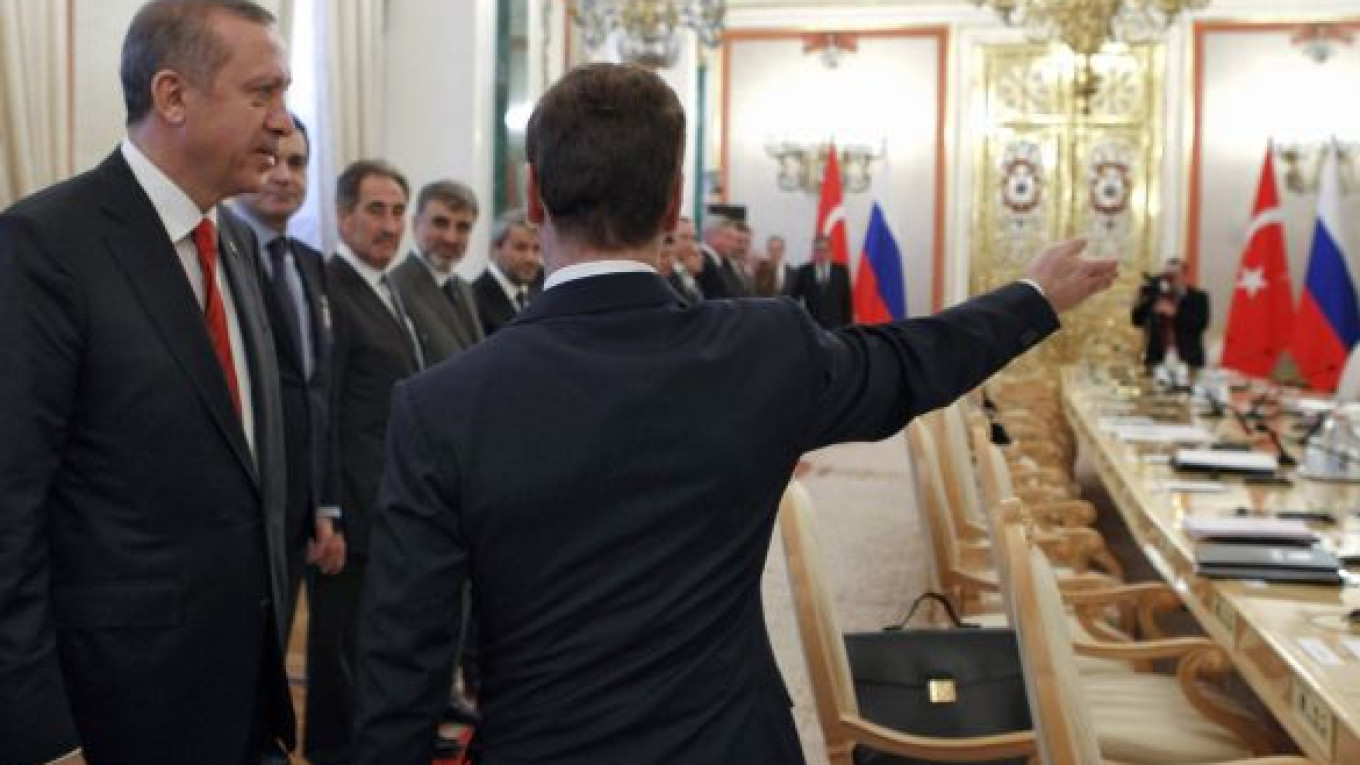Turkey on Wednesday reiterated its commitment for a Russian-built nuclear plant in an important show of confidence in atomic energy as a tsunami-battered Japan tried to prevent major radioactive contamination.
But Moscow made it clear that something has gone wrong in another key area where it has counted on Ankara's support: the South Stream pipeline.
President Dmitry Medvedev and Turkish Prime Minister Recep Tayyip Erdogan stressed that nuclear power could be safe even for earthquake-prone areas such as Japan and Turkey.
"I am sure that the nuclear power plant to be built in Turkey will be a model for the rest of the world," Erdogan said after a meeting with Medvedev in the Kremlin. "We can't drop joint projects because of earthquakes."
Medvedev said the reactors that Russia plans to construct in Turkey are much newer in design than the ones that are causing trouble in Japan and therefore require no drastic safety improvements, if any, to sustain even the "most devastating" earthquake. That said, Russia is open to discuss "optimizing" the work, he said.
Russia agreed in May to build and own a nuclear power plant in Akkuyu. Erdogan said at a meeting with Prime Minister Vladimir Putin later Wednesday that the plan was to lay the foundation for the plant in late April or May.
There appeared to be less unity between the countries on the matter of South Stream. Deputy Prime Minister Igor Sechin indicated that Russia had expected Turkey to issue the final permit for the pipeline to cross the Turkish waters of the Black Sea months ago. Instead, Turkey only allowed Gazprom to conduct seabed exploration in the waters and asked for more information, he said.
"So far, we don't understand the reasons why we didn't receive the permit," he told reporters after the Medvedev-Erdogan talks, adding that the country leaders had talked about the issue.
Putin last week ordered Energy Minister Sergei Shmatko to research the option of building an LNG plant on the Russian coast of the Black Sea to produce shipboard gas in addition to the pipeline. Shmatko's deadline expired precisely as Erdogan arrived for talks, but the ministry has not reported its findings publicly.
The LNG plant proposal prompted some analysts to raise doubts about the underwater stretch of South Stream. Russia's ambassador to Turkey, Vladimir Ivanovsky, said Wednesday that the LNG plant would be an alternative to the pipeline, Interfax reported.
Medvedev and Erdogan said only that the countries would continue to work on the pipeline project.
Gazprom and Italy's Eni are planning to invest upward of 10 billion euros ($14 billion) to lay the pipeline under the sea and across several south European countries in a bid to reduce transit through Ukraine.
The disagreement over South Stream is unfolding as Turkey fails to make progress in securing Russian support for an oil pipeline across Turkey. Russia backed the idea in general in October 2009 but said transportation costs on the Samsun-Ceyhan route would be too high.
The pipeline, which would take off the increasing load from the congested Bosporus, would require investment of $4 billion. Rosneft and Transneft could join the project, which is now a joint venture between Turkey's Calik and Eni.
Erdogan said Wednesday that he wanted work on the project to speed up.
Turkey hasn't been successful in winning discounts for Russian gas supplies during the time of glut.
Medvedev said Wednesday that discounts were possible in exchange for Turkish concessions, which he didn't specify.
"We are ready to consider various approaches and respond to some proposals with a view to the market situation, but this process must be mutual," he said. "If we treat such projects and decisions as friends … [and] if we spend our political resources reasonably, then the problems on the market will be less obvious."
Sechin said the gas price would only grow, given the political unrest in the Middle East and North Africa.
A Message from The Moscow Times:
Dear readers,
We are facing unprecedented challenges. Russia's Prosecutor General's Office has designated The Moscow Times as an "undesirable" organization, criminalizing our work and putting our staff at risk of prosecution. This follows our earlier unjust labeling as a "foreign agent."
These actions are direct attempts to silence independent journalism in Russia. The authorities claim our work "discredits the decisions of the Russian leadership." We see things differently: we strive to provide accurate, unbiased reporting on Russia.
We, the journalists of The Moscow Times, refuse to be silenced. But to continue our work, we need your help.
Your support, no matter how small, makes a world of difference. If you can, please support us monthly starting from just $2. It's quick to set up, and every contribution makes a significant impact.
By supporting The Moscow Times, you're defending open, independent journalism in the face of repression. Thank you for standing with us.
Remind me later.


